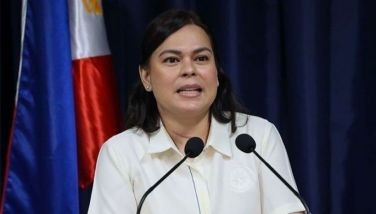Name rogue policemen, lawmaker urges Ebdane
September 23, 2002 | 12:00am
An administration congressman urged Philippine National Police (PNP) chief Director General Hermogenes Ebdane yesterday to identify the 356 policemen whom he called "rascals in uniform."
"The public has the right to know the identities of PNP officers and other personnel moonlighting as criminals," said Rep. Juan Miguel Zubiri (Lakas, Bukidnon).
"If their names are made public, then their victims will be encouraged to come out in the open and file complaints against them," he said.
The publication of the list could also cause embarrassment on the rogue policemen and could discourage them from further engaging in criminal activities, he said.
In revealing that 356 policemen are "rascals in uniform," Ebdane said at least 50 are officers and 132 are "incorrigibles."
He said these wayward PNP personnel are being watched.
Zubiri said judging from the way the PNP chief described rogue policemen, administrative or criminal charges, or both, must have been filed against them.
If that were so, then there should be no hindrance in disclosing their names, he said.
"There should be fairness here. If private citizens suspected of criminal activities can be identified, the more we can name public officers whom we believe are into something illegal. More so if they are policemen who are supposed to enforce the law," he said.
He added that the public would be particularly interested to know if there are generals (chief superintendent) or colonels among the wayward PNP officers.
"What we have here is a rogue force that is almost a battalion size," he noted.
Ebdane, meanwhile, has vowed to deploy more policemen on motorcycles and equipped with a two-way radio to increase police presence in the streets.
Ebdane told reporters yesterday a two-way radio would allow policemen nationwide to respond to a situation within a few minutes and cover a wider area in their patrols.
"You give them a motorcycle and a radio, and two personnel can cover as much as 6-10 blocks, and you can recall them anytime you want, and you can provide more frequency patrols," he said.
"You might call it semantics but we used to call the deployment of police personnel as police visibility, providing the uniformed troops in the streets without the necessary equipment on foot and radio to the point that we can’t recall them where there are incidents in other areas."
Ebdane said the new approach on police visibility calls for more mobility and an expanded communications system through a two-way radio for each foot patrolman.
"We would like to change our approach by optimizing what we have in terms of personnel, equipment, and mobility by deploying specific teams forward to potential problem areas," he said.
Ebdane said guns will be issued to some 20,000 policemen out of the 103,000-strong PNP who have not yet received their service firearms.
The PNP’s P549-million budget will be tapped to acquire radios, firearms, patrol cars, motorcycles and other police equipment, Ebdane added.
Meanwhile, Marikina City police director Senior Superintendent Leonardo Espina said yesterday he has deployed uniformed policemen in the city’s different barangays to maintain peace and order.
Espina said Marikina also has a tactical operations center (TOC) which could be reached through telephone number 161 in case of emergency.
"The effective TOC also makes it easier for the Marikina City police personnel to establish a quick response system," he said.
The TOC also coordinates with the fire department and sends a medical team in case of accidents and other emergencies, Espina added. – Christina Mendez
"The public has the right to know the identities of PNP officers and other personnel moonlighting as criminals," said Rep. Juan Miguel Zubiri (Lakas, Bukidnon).
"If their names are made public, then their victims will be encouraged to come out in the open and file complaints against them," he said.
The publication of the list could also cause embarrassment on the rogue policemen and could discourage them from further engaging in criminal activities, he said.
In revealing that 356 policemen are "rascals in uniform," Ebdane said at least 50 are officers and 132 are "incorrigibles."
He said these wayward PNP personnel are being watched.
Zubiri said judging from the way the PNP chief described rogue policemen, administrative or criminal charges, or both, must have been filed against them.
If that were so, then there should be no hindrance in disclosing their names, he said.
"There should be fairness here. If private citizens suspected of criminal activities can be identified, the more we can name public officers whom we believe are into something illegal. More so if they are policemen who are supposed to enforce the law," he said.
He added that the public would be particularly interested to know if there are generals (chief superintendent) or colonels among the wayward PNP officers.
"What we have here is a rogue force that is almost a battalion size," he noted.
Ebdane told reporters yesterday a two-way radio would allow policemen nationwide to respond to a situation within a few minutes and cover a wider area in their patrols.
"You give them a motorcycle and a radio, and two personnel can cover as much as 6-10 blocks, and you can recall them anytime you want, and you can provide more frequency patrols," he said.
"You might call it semantics but we used to call the deployment of police personnel as police visibility, providing the uniformed troops in the streets without the necessary equipment on foot and radio to the point that we can’t recall them where there are incidents in other areas."
Ebdane said the new approach on police visibility calls for more mobility and an expanded communications system through a two-way radio for each foot patrolman.
"We would like to change our approach by optimizing what we have in terms of personnel, equipment, and mobility by deploying specific teams forward to potential problem areas," he said.
Ebdane said guns will be issued to some 20,000 policemen out of the 103,000-strong PNP who have not yet received their service firearms.
The PNP’s P549-million budget will be tapped to acquire radios, firearms, patrol cars, motorcycles and other police equipment, Ebdane added.
Meanwhile, Marikina City police director Senior Superintendent Leonardo Espina said yesterday he has deployed uniformed policemen in the city’s different barangays to maintain peace and order.
Espina said Marikina also has a tactical operations center (TOC) which could be reached through telephone number 161 in case of emergency.
"The effective TOC also makes it easier for the Marikina City police personnel to establish a quick response system," he said.
The TOC also coordinates with the fire department and sends a medical team in case of accidents and other emergencies, Espina added. – Christina Mendez
BrandSpace Articles
<
>
- Latest
- Trending
Trending
Latest
Trending
Latest
Recommended





























